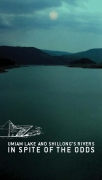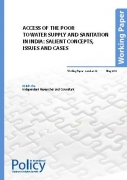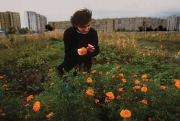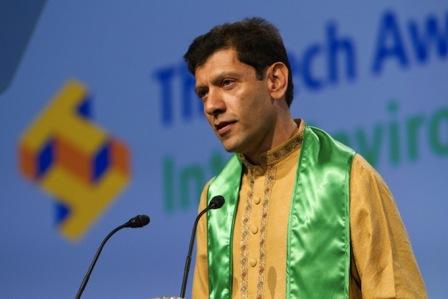Equity
Umiam Lake and Shillong's Rivers: In spite of the odds – An advocacy flyer by Arghyam and Peoples Learning Centre
Posted on 22 Dec, 2010 11:01 PM This advocacy flyer by Arghyam and Peoples Learning Centre (PLC) Shillong highlights some of the main problems, action underway and potential solutions to cleaning up the water bodies of Shillong. It deals with the expanding human habitats and escalating socio-economic activities around the rivers Umkrah and Umshyrpi that flow through Shillong leading to their choking with sewage and pollution. This wastewater eventually enters Lake Umiam, which is a reservoir for hydro-electric power.
This advocacy flyer by Arghyam and Peoples Learning Centre (PLC) Shillong highlights some of the main problems, action underway and potential solutions to cleaning up the water bodies of Shillong. It deals with the expanding human habitats and escalating socio-economic activities around the rivers Umkrah and Umshyrpi that flow through Shillong leading to their choking with sewage and pollution. This wastewater eventually enters Lake Umiam, which is a reservoir for hydro-electric power.
PLC is a non-profit organisation that works towards promoting knowledge on equity and rights, and is a platform for facilitating interdisciplinary dialogues between stakeholders in key developmental issues. Arghyam supports PLC in engaging with decision makes as well as citizens in order to create public opinion about river and lake pollution, and promote catchment friendly practices.
Voelkel Industrie Produkte (VIP) GMBH Exhibiting in EA Water, Mumbai
Posted on 21 Dec, 2010 06:13 PMOrganizer: EA Water Private Limited
Access of the poor to water supply and sanitation in India - Salient concepts, issues and cases by the International Policy Centre for Inclusive Growth
Posted on 20 Dec, 2010 10:04 PM This paper by the International Policy Centre for Inclusive Growth deals with access of the poor to water supply and sanitation in India. It argues that economic, technical, institutional as well as social factors constrain access to safe drinking water and proper sanitation in India for both the urban and rural poor, and that coverage figures do not reflect this restricted access. It finds that, increasingly, communities are being required to manage their own water and sanitation schemes, not just in rural areas but in urban ones as well.
This paper by the International Policy Centre for Inclusive Growth deals with access of the poor to water supply and sanitation in India. It argues that economic, technical, institutional as well as social factors constrain access to safe drinking water and proper sanitation in India for both the urban and rural poor, and that coverage figures do not reflect this restricted access. It finds that, increasingly, communities are being required to manage their own water and sanitation schemes, not just in rural areas but in urban ones as well.
The paper deals with domestic water supply and sanitation and presents a historical overview of the phenomenon in rural and urban India. This is followed by a critique of available figures for coverage which, it is contended, seem exaggerated because they do not account for the several constraints to access. It addresses the specific institutional problems faced in the public sector delivery of these two utilities in India apart from dealing with the parallel yet thus far limited presence of the private sector in these twin arenas.
The wealth of waste: The economics of wastewater use in agriculture - A report by FAO
Posted on 17 Dec, 2010 07:36 PM This report by the Food and Agriculture Organisation (FAO) deals with the economics of wastewater use in agriculture. It presents an economic framework for the assessment of the use of reclaimed water in agriculture, as part of a comprehensive planning process in water resource allocation strategies to provide for a more economically efficient and sustainable water utilization.
This report by the Food and Agriculture Organisation (FAO) deals with the economics of wastewater use in agriculture. It presents an economic framework for the assessment of the use of reclaimed water in agriculture, as part of a comprehensive planning process in water resource allocation strategies to provide for a more economically efficient and sustainable water utilization.
Peer Water Exchange (PWX) receives 2010 Intel Environment Award
Posted on 29 Nov, 2010 04:40 PM
The Peer Water Exchange (PWX) was awarded the 2010 Intel Environment Award today. PWX, a project of Blue Planet Network, is a combination of process, technology platform, and people designed to unlock the global capacity and creativity of individuals, philanthropies, businesses and implementers to solve the global safe drinking water and sanitation crises.

Palak Dil Lake - Mizoram
Posted on 26 Nov, 2010 03:00 PMThe Mizoram state has three types of (natural) lakes: valley lakes, tectonic/landslide lakes and artificial reservoirs, but the only lake of significance is Palak Dil, which is a natural lake in a depression in the hills. Palak Dil may possibly be a combination of valley and tectonic lakes. Locally in Mizoram, lakes are called dils. There are many such dils scattered all over the state, but they are tiny pools or marshy depressions such as Rengdil, Tamdil and Mampui Dil (Choudhury 2002). The Palak Lake is situated within the Mara Autonomous district Council, which is a region inhabited by the Mara Tribe. The Maras are distinct from the majority Mizos and in the Mara language the Palak Lake is referred to as Pala Tipa.
Watershed development in India: Biophysical and societal impacts - Research paper from Environ Dev Sustain journal
Posted on 15 Nov, 2010 11:12 PMThe paper argues that watershed management has to be fluid to take into consideration new realities like change in flow conditions, external realities like unintended impacts and the need to maintain minimum downstream flows for environmental and other purposes.
Launching Samajik Parivartan Yatra
Posted on 25 Oct, 2010 01:29 PMManual scavenging is the most obnoxious and inhuman practice violating the dignity and human personhood of safai karmacharis. It involves the engagement or employment of sections of people to manually dispose human excreta from dry latrines with bare minimum aids such as scrappers, brooms and baskets.
Manual scavenging is integrally linked with caste system and is imposed on certain dalit sub-caste groups particularly on their women. As a result all persons engaged in manual scavenging are dalits, and of them 82% are women.
The unsung struggles of Safai Karamchari - Updates on Samajik Parivartan Yatra
Posted on 25 Oct, 2010 10:30 AM

7th Oct
The Birsa Munda Marga - Samajik Parivarthan Yatra, started in Dibrugarh, Assam on 7th October at 3 p.m.
Samajik Parivartan Yatra updates - 7th October, 2010 : Community meeting held in Valmiki Mohalla
Posted on 22 Oct, 2010 03:19 PMFrom Ludhiana: Bassi Pathana Town - Fathegar sagar district:
A Community meeting was held in Valmiki Mohalla. It was attended by local eminent persons from the community, Mr. Sardar Sukhdev Singh Jamagal - rtrd Additional Judge, Mr. Kaval Jit Singh Mattu, Advocate, Mr. Dholak Ram - and President, Safai karmachari Union, and community leader Mr. Ram ji Lal, Govt Employee. 12 liberated SK women took the responsibility of organising a meeting in the basti with the support of committee people. They invited the community as well as general public to the meeting, where the mission, demands, SKA’s back ground were discussed and people’s views were taken.



